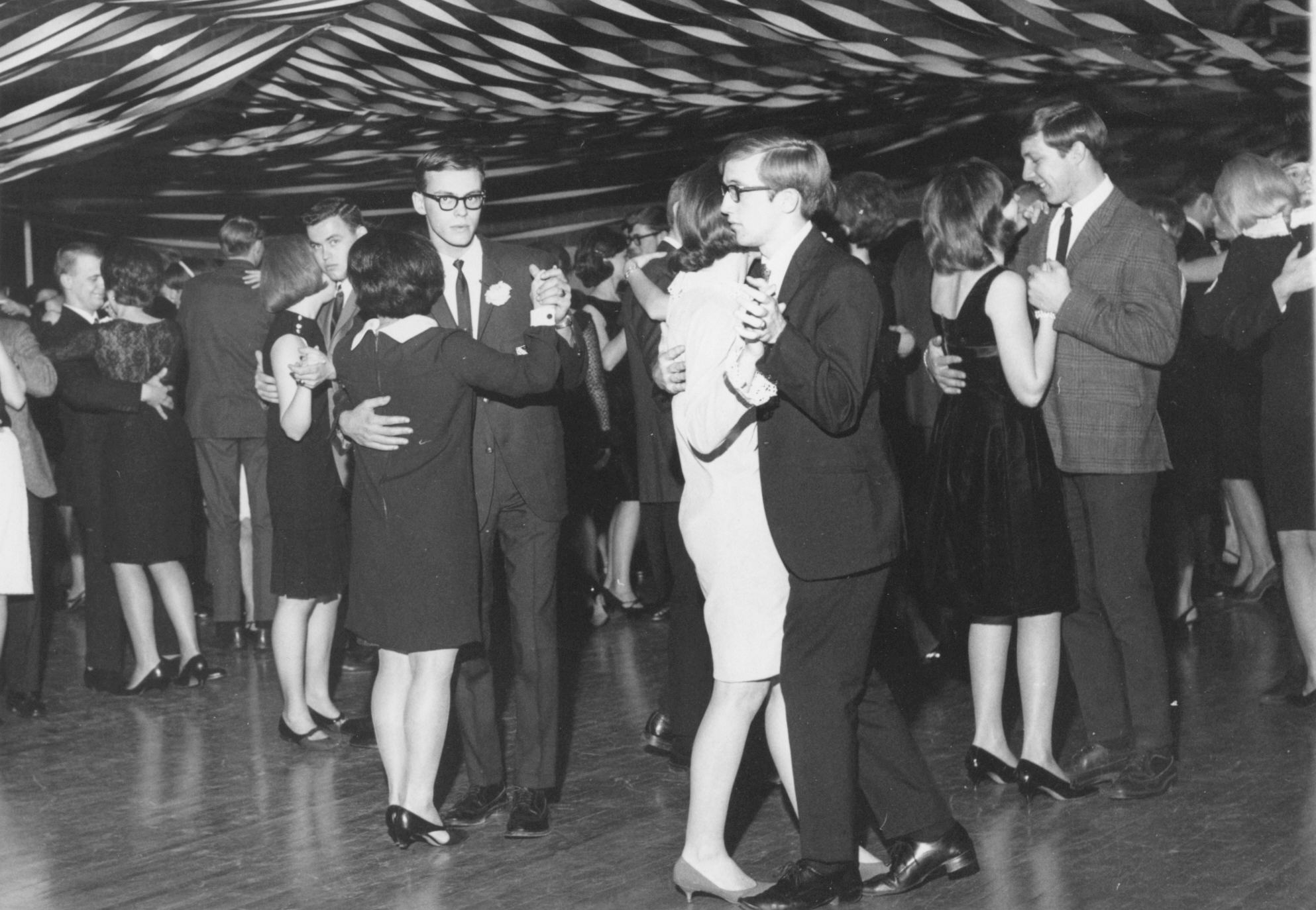|
Click on some
images
for further information
________________________
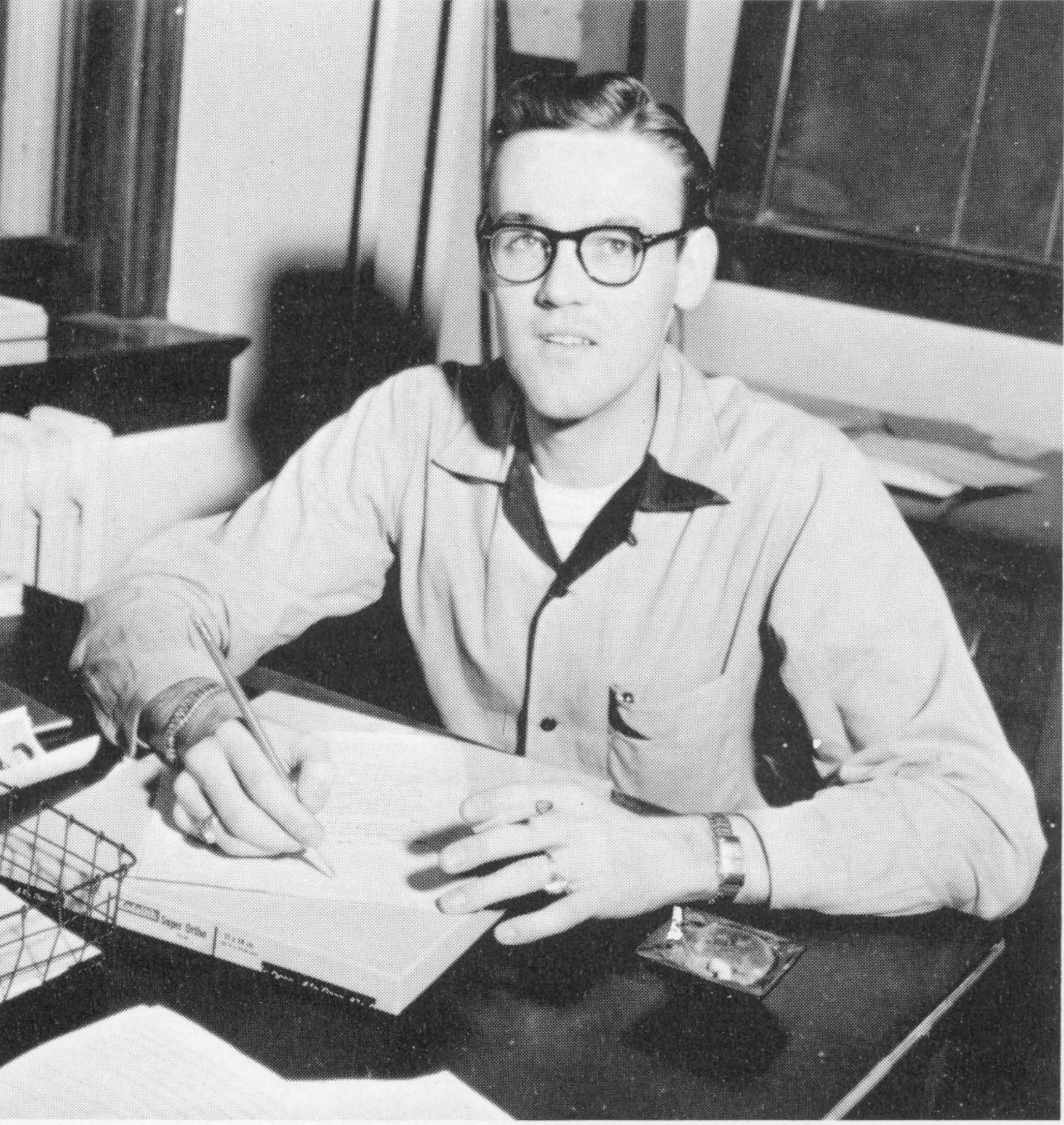
Harlan Shuck -- class of 1958 (click image)
________________________
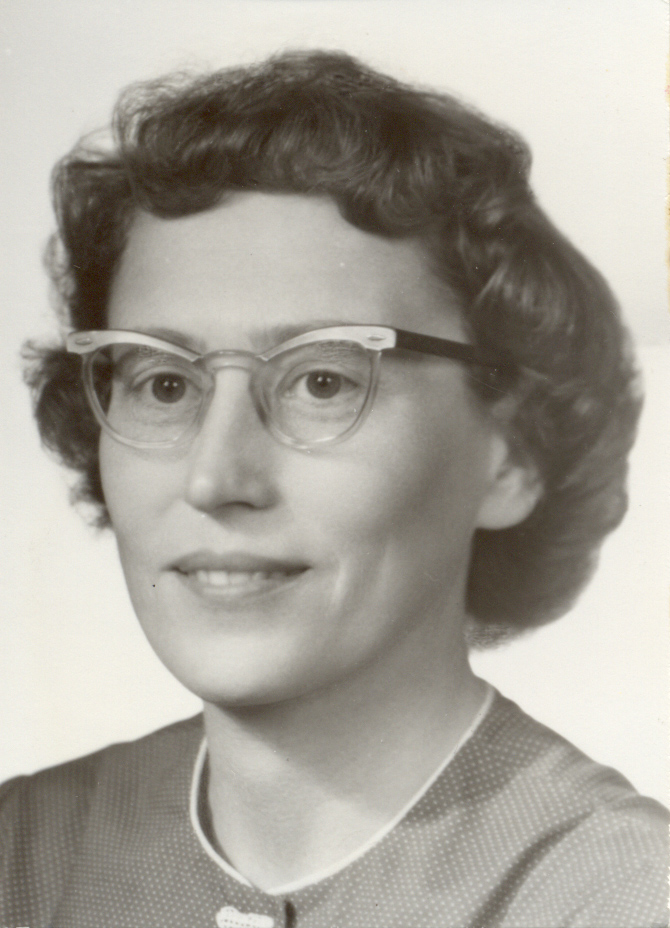
Shelda Jacobson (later Shelda Warren)
was the first student to earn a graduate degree
at MSC, and later taught mathematics at the
school for over thirty years.
__________________________
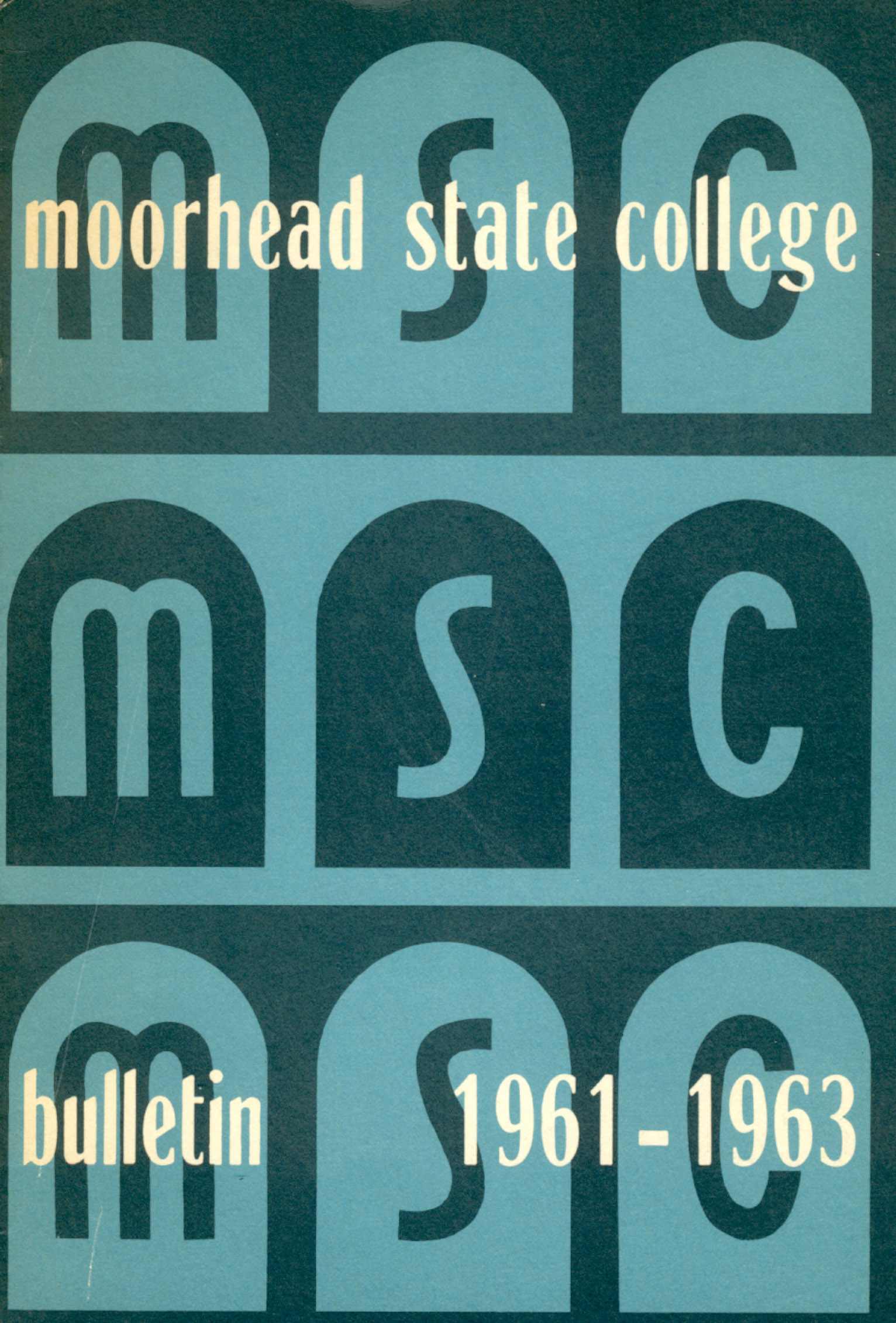
Read the introductory pages
of the 1961-63 MSC Bulletin
(click cover, in Adobe format)
__________________________
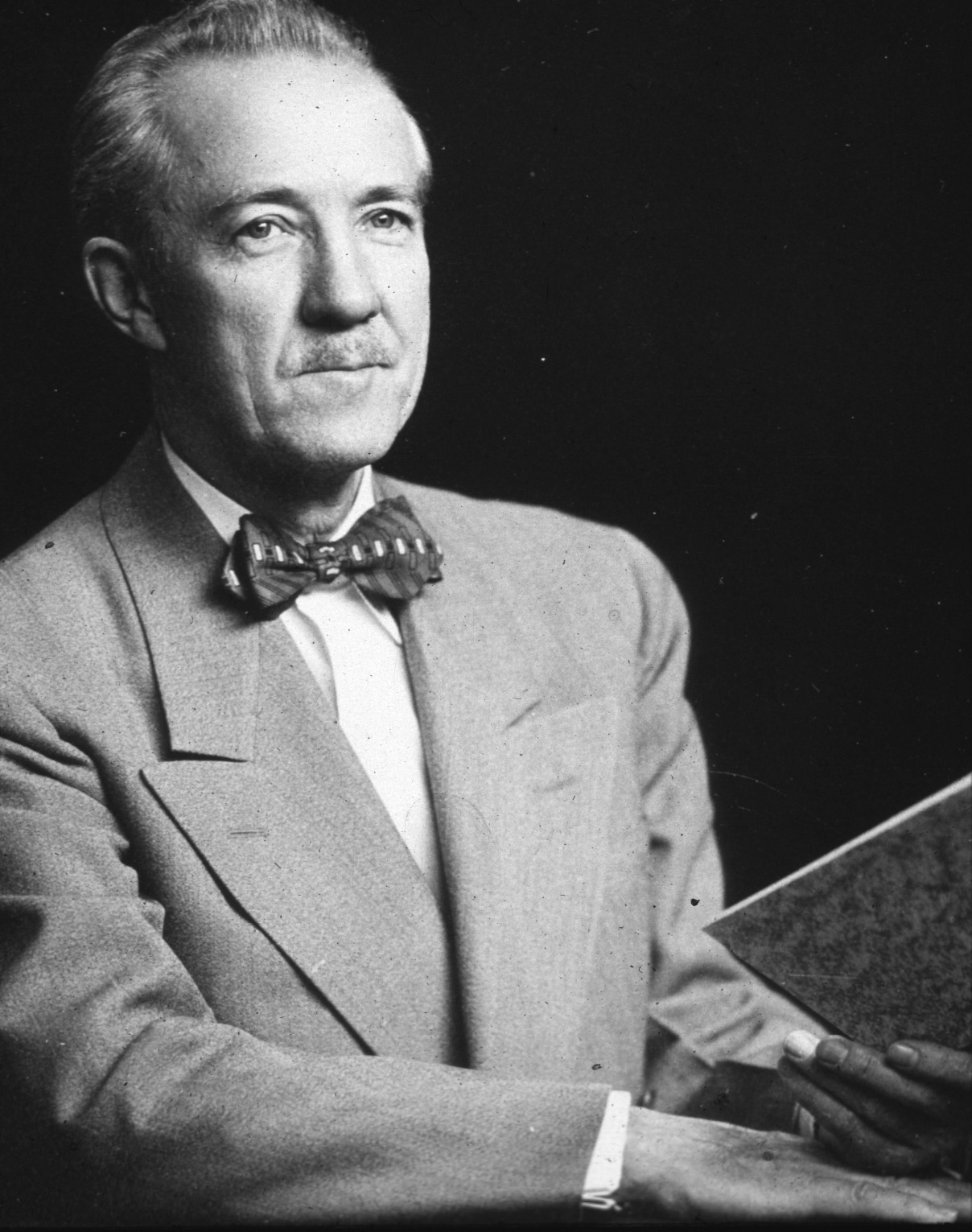
Joseph Kise (click image)
_________________________
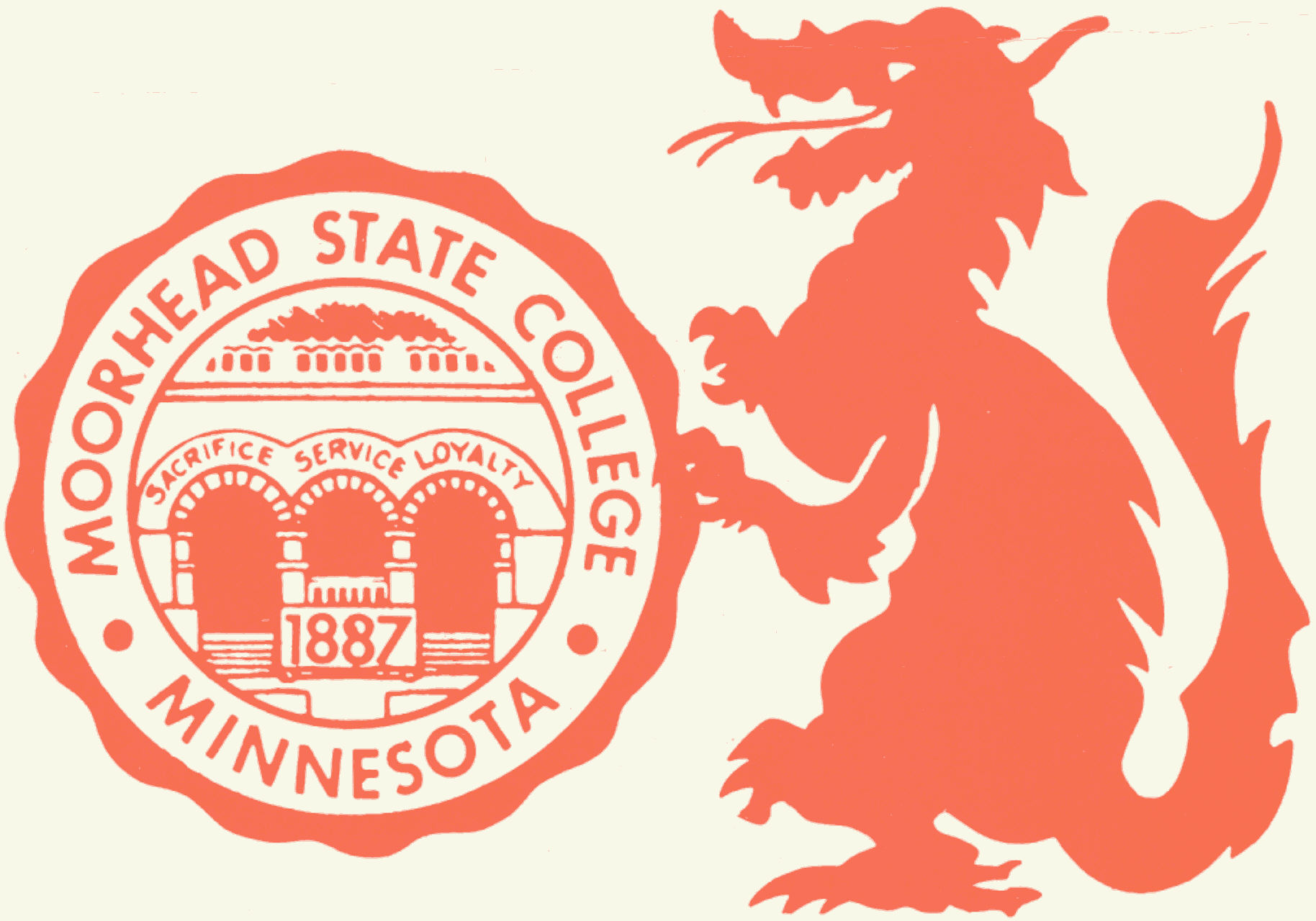
Dragon Mascot of the 1960s -- click image for a
roundup of the decade in sports
__________________________

Alumni Association letter
(click for larger copy)
____________________________
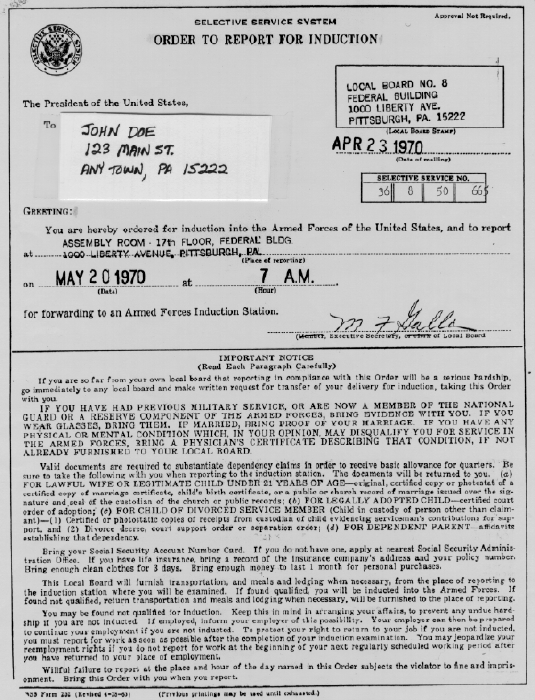
1960s generic draft notice (click image)
____________________________
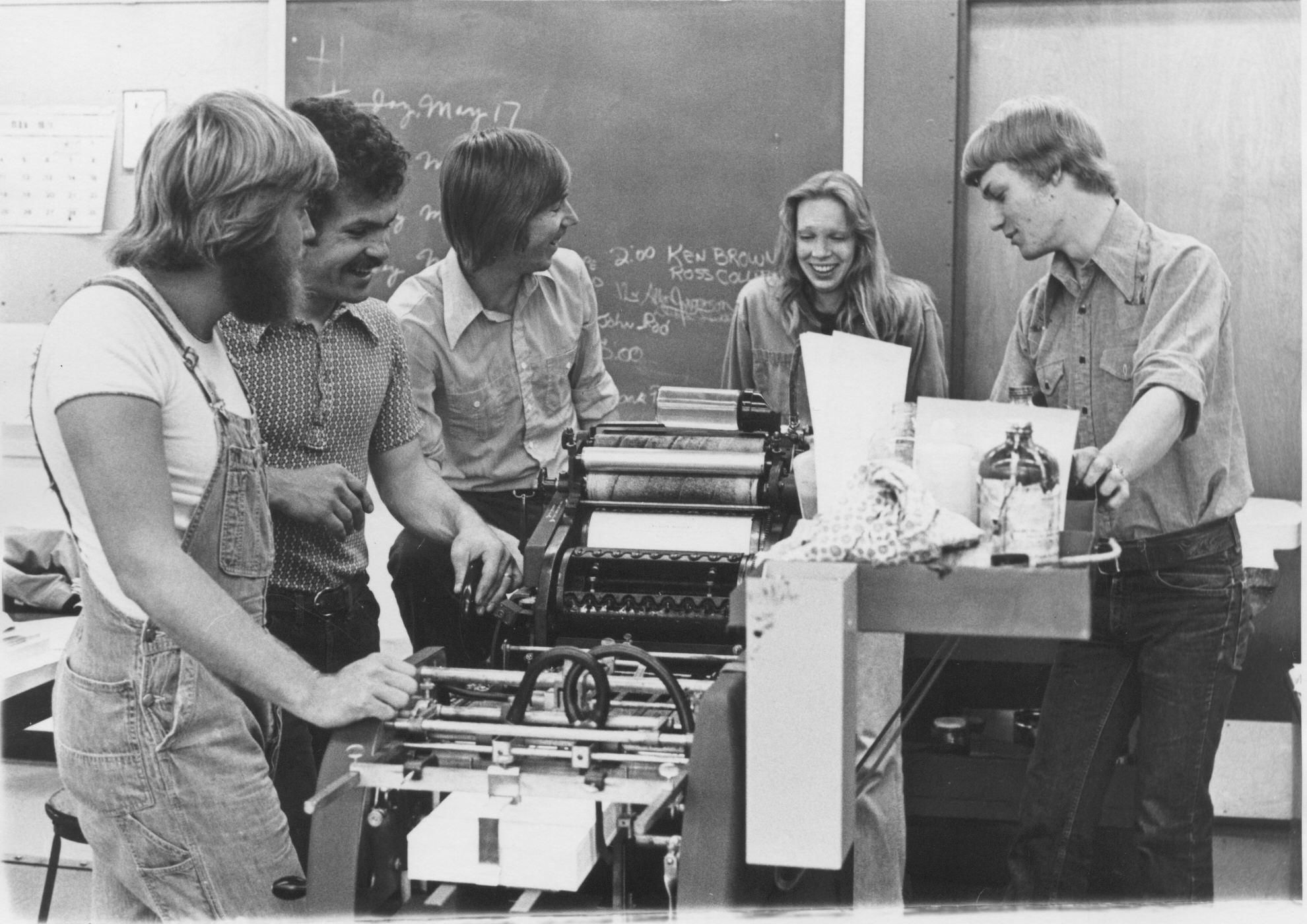
Before the late-70s revolution in
computers. educational technology since 1955
meant small printers, spirit duplicators, 16mm
film projectors, and a few electric typewriters
and photocopiers (photo, ca. 1969-70).
____________________________

How MSC student activity
fees were spent in 1965
_______________________________
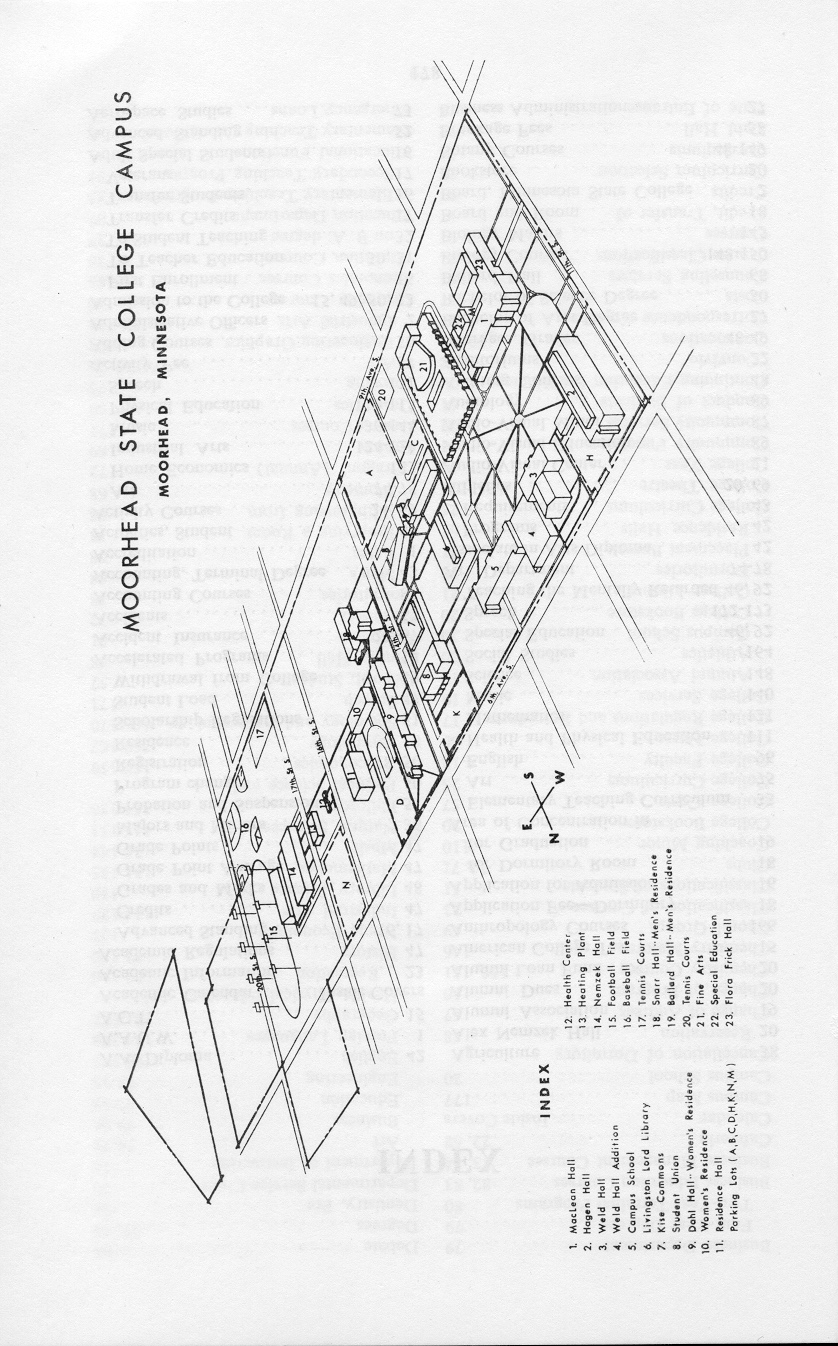
Campus Map, 1965 (click image)
______________________________
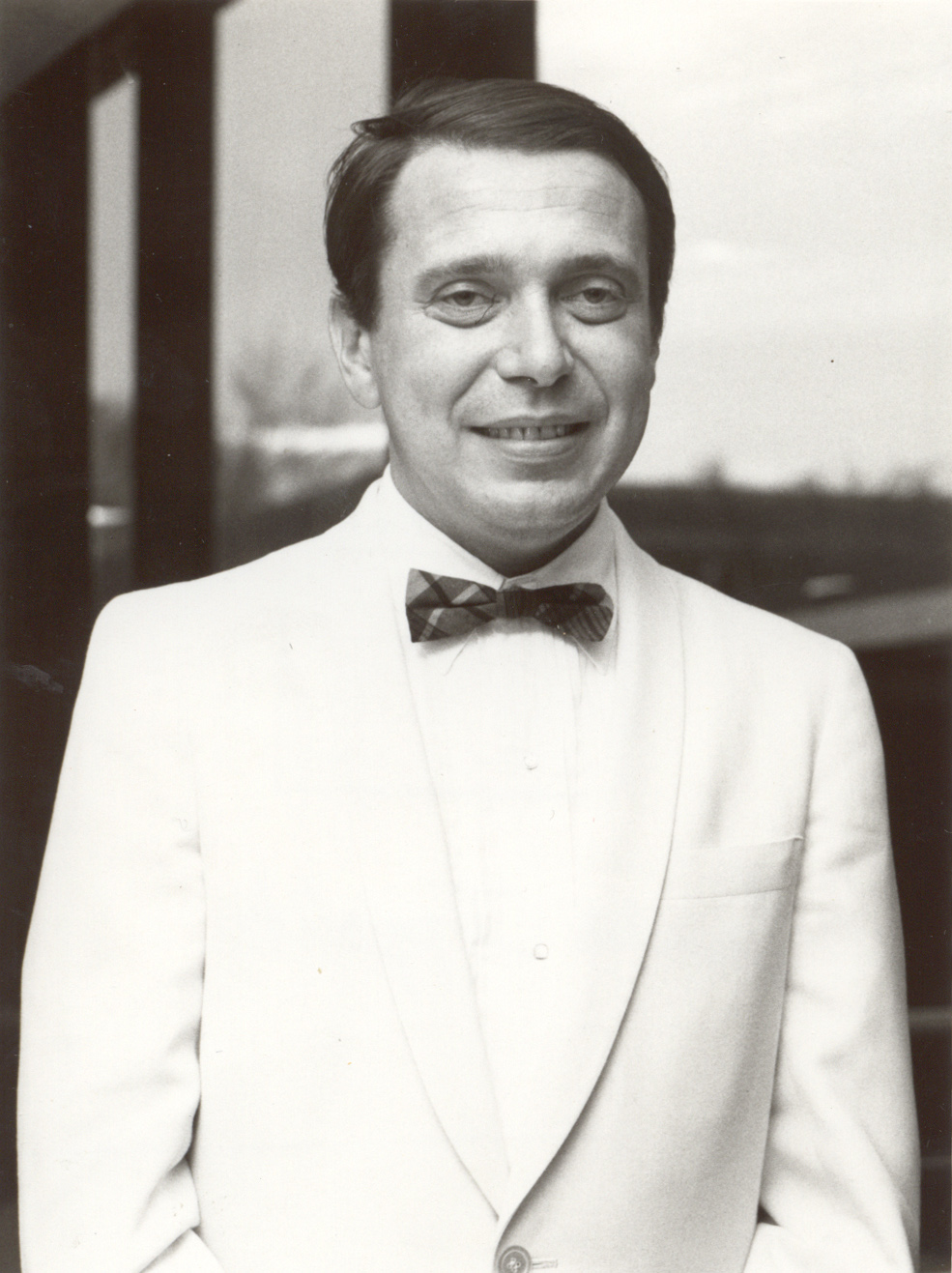
Gerald Ippilito (Theater Department) was
coordinator of the Performing Arts Series at
Moorhead State from 1965 until his death in 1974
_______________________________
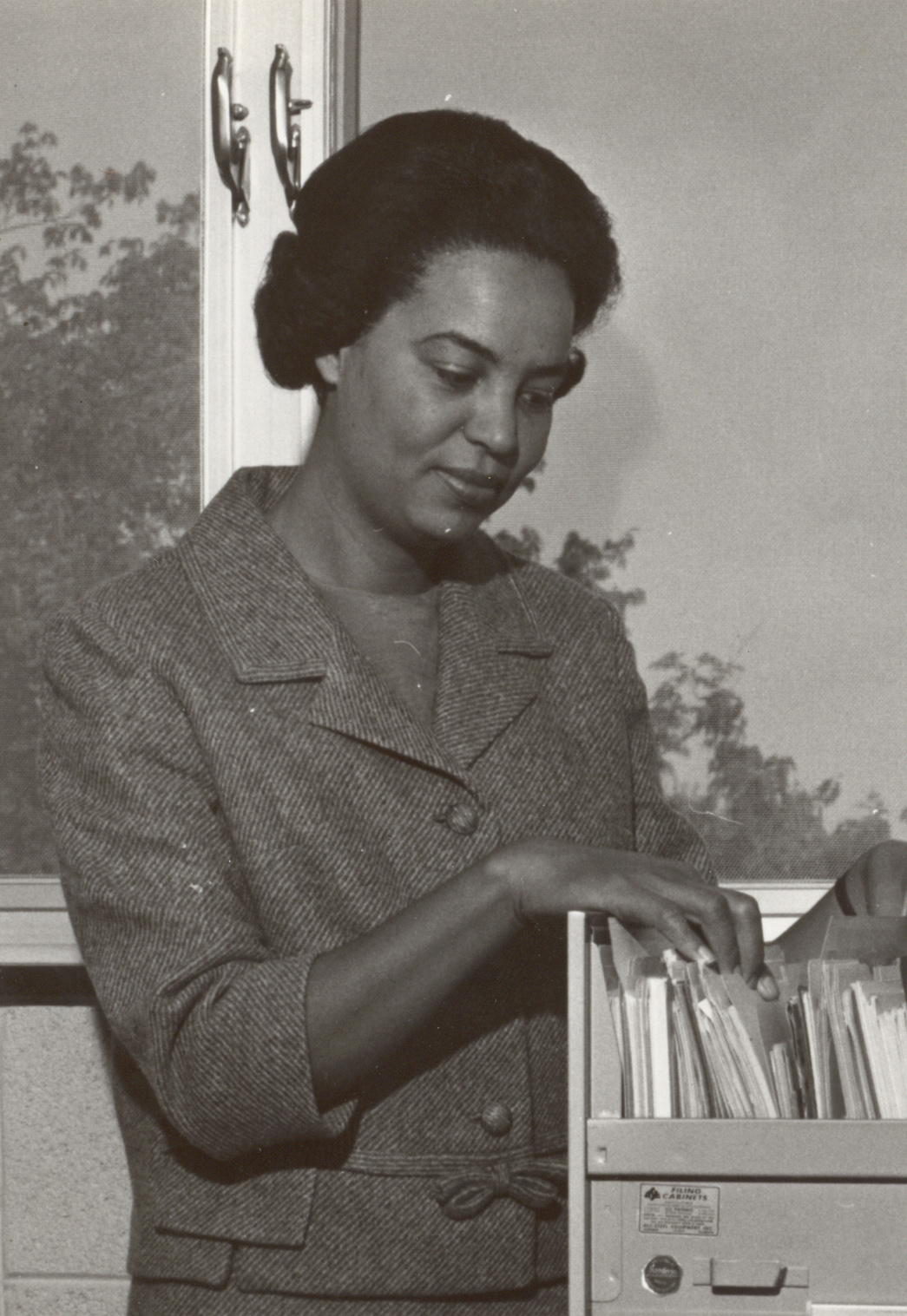
Dr. Yvonne Condell (about 1967)____________________________

CLICK BUTTON ABOVE FOR THE REST OF THE 1960s
|
TIMELINE (**some linked documents
require Adobe software to read)
August, 1957 -- Moorhead State Teachers College is
renamed Moorhead State College (MSC) -- (read the official announcement).
The tuition is for 1957 is $40.00 per
quarter (fall, winter and spring) for residents,
$120.00 per quarter for non-Minnesota students.
Spring, 1958 --
Controversy over use of student-collected funds
for a student union leads to a short "protest"
when an old church bell tower burns one night in
the center of campus. (read
memories of some students concerning the
controversy).
August, 1958 -- Dahl Hall, the new dormitory for
women students, opens. Federal student
loans, provided by the newly passed National
Defense Education Act (NDEA) makes it a
certainty that college enrollments will grow for
decade.
July-August, 1958 -- Arthur Knoblauch, sixth
president of Moorhead State, leaves to become president of
an Illinois college. John Neumaier becomes the seventh
president of MSC. (see
Neumaier's
reflections on coming to MSC).
June, 1960 -- MSC awards degrees to 190 students
at the 57th Spring Commencement ceremony; two
are MS degrees in Education, the only graduate
program offered. The newly printed
MSC Bulletin
profiles the college -- 73
college faculty, approximately 1500 students
(full- and part-time), nine buildings (including
the newly opened Livingston Lord Library).
August, 1960 -- Tuition is
now based on credits taken; for 1960-61 is $3.50 per credit for residents of Minnesota,
$5.50 per credit for out-of state residents.
Housing costs $210 per quarter (for $10 extra a
student can have a single room). Fees
amount to $10 per quarter. "Sixteen
credits is considered a typical load" of classes
per quarter, 48 credits for a standard academic
year. Enrollment grows to 1555 students,
the largest increase to date.
September 1960 -- John Neumaier announces that,
with a 62 percent increase in full-time,
on campus students, MSC is "one of the
fastest growing colleges in the Upper Midwest."
To deal with the number of new students, Floyd
Brown, an experienced high-school counselor,
joins the administration as Director of
Counseling.
January, 1961 -- Asked in a campus poll if a
student would pay "five dollars a quarter toward
the construction of a student center," 638 say
"yes," 151 say "no." Preliminary planning
begins for building a student union.
March, 1961 -- Rev. James Henderson, pastor of
the Moorhead Presbyterian Church, speaks at the
campus Easter Convocation on the subject of the
Resurrection as "A Day to Remember. "
He tells the students that if the Christian
Resurrection does not exist, "then this world is
a stupid joke."
May, 1961 -- Ada Comstock Notestein, the
daughter of Moorhead pioneer Solomon Comstock,
speaks at the dedication of the new Livingston
Lord
Library on campus. Notestein, the former
president of Radcliffe College, urges women
students to expand roles for women
in American business and public service.
(see
Library Dedication program).
June 1961 -- MSC adopts the American College
Test (ACT) as a prerequisite for admission to
the College. Recommendations from high school
principals are no longer necessary.
October, 1961 -- Dr. Robert Hanson, director of
admissions at MSC, assures students that a
standing policy "initiated during the Korean
crisis of the 1950s," will grant any student
"drafted into the military . . . full credit to all courses in which he
is doing satisfactory work."
November, 1961 -- MSC faculty debate a
resolution recently passed by the Western
Division of the Minnesota Education Association.
The MEA resolution calls for special lesson units
in "patriotic anti-communism" to be taught in
all Minnesota schools, grades four through
twelve. The MSC faculty by a vote of 66 to
6 refuses to endorse the resolution, favoring
instead classes "to further
international understanding.
1961-1962 -- As the number of students
enrolling in colleges continues to rise across
the nation, the MSC administration issues a
"Report on Facilities" which estimates that at least
sixty more faculty, two more dormitories and "a
humanities building" would be needed within the
next seven years.
February, 1962 -- George Starcher, president of
the University of North Dakota, addresses MSC
students in an on-campus convocation.
Emphasizing that education must now change to
"free peoples' minds of stereotyped ideas," he
predicts that in the future, students will
insist on having more influence over the contents
of their learning.
June, 1962 -- MSC awards 214 degrees at Spring
Graduation exercises. Exit interview with
students show that over two-thirds of the
graduates have already found jobs in the booming
national economy -- (see the 1962
commencement program).
August, 1962 -- Newly finished men's dormitory
opens on campus. In the Spring it will be
named Snarr Hall for MSTC president Otto Snarr
(1940-55).
In 1962, the average cost of gasoline is 31
cents a gallon. Milk costs 49 cents a
gallon, first-class stamps cost 4 cents, and the
average cost of a new home is $18,200.
Tuition at MSC holds steady, but will be raised in
the fall of 1963 to $4.25 per credit.
September, 1962 -- On-campus enrollment reaches
a new record -- 2129, representing 22 of the
US states and 7 foreign countries. Dr. Neumaier emphasizes that MSC is becoming not
just a regional Minnesota school but a widely
recognized liberal arts college.
January, 1963 -- Earl Herring, assistant to the
president, announces that construction of the
long-anticipated student union should begin in
1964 and be completed the following year.
"General plans now are that the Student Union
would be built as a northern extension of the Kise Commons cafeteria."
April, 1963 -- As new junior colleges are being
constructed in Minnesota, MSC President John
Neumaier urges the state to develop a plan for a
"Liberal Arts education" that could match the
best offered anywhere else in the nation. (read
Neumaier's speech).
May, 1963 -- MSC Academic Dean Wilbur Williams
sends a memo to department chairpersons noting
that soon "merit raises" in pay will be
distributed to a select number of faculty. These
raises "assist in the process of
differentiating" between faculty on the basis of
teaching performance and scholarly publication.
The merit raises are welcomed by some faculty
while others see them as a divisive force.
(read
Williams' memo).
November, 1963 -- President Neumaier speaks at a
special joint MSC-Concordia College "memorial
service in memory of John Fitzgerald Kennedy."
Neumaier urges college students as graduates to
honor the assassinated president by working for
reforms, removing "hatred and prejudice" and
promoting "social justice."
February, 1964 -- Many MSC student attend the
3rd Annual Institute on Human Rights, in which
regional, national, and international scholars
invited to campus discuss issues on human rights
and "promotion of international understanding."
Several of the students at the sessions tell
Mistic
reporter that they hope to join the
Peace Corps after graduation. Unknown to all of
them, the US military is increasing the number
of "military advisors" in South Vietnam.
May, 1964 -- Leonard Inskip, columnist for
Minneapolis Tribune,
praises MSC administration for leadership in
persuading the State Education Board to approve
higher entrance requirements at all state
colleges, MSC personnel have worked hard
"to assemble the best teachers and the best
students" and have substantially revamped its
academic program to stress liberal arts.
September, 1964
-- Over 2800 students are enrolled this fall.
Another new Federal program helps with the cost
of college -- the College Work-Study Program.
October, 1964 --
Concerned about the growing trend to dress casually,
the Student Commission adopts a rule requiring
students to follow a strict dress code on
Sundays, in the cafeteria. Men are required to
wear "a shirt and tie, sweater or sport coat,
dress slacks and oxford shoes." Women are
expected to "wear dresses, nylons, and flats or
heels." In addition, "girls will
not be served evening meals during the week if
they are not wearing "skirt, dress, or
culottes." Students appear to accept the
rule -- for now.
October, 1964
-- Student Patrick Day (future Dean of
Instruction at St. Thomas University) pens a
mocking letter to the
Mistic, complaining about
hours at the college library: "hows we sposed to git
smart when librery don't stay open but to
9:30? Udder coleges stay open ladder -- why nut
uss?"
October, 1964 -- Students Doug
Johnson and Tom Bertek, presidents, respectively,
of the Young Republicans (YGOP) and Young
Democrats (YDFL), debate the merits of the two
candidates for US president. "Barry
Goldwater does not promise that if he is elected
there will be something for everyone," argues
Doug Johnson; "Barry Goldwater does promise to
maintain the highest of character and morality."
Lyndon Johnson will aid higher education, fight
poverty and "keep the world in peace," replies Bertek; young people should heed Johnson's call
to "ignite a fire in the breast of this land,
a flaming spirit of adventure that soars beyond
the ordinary and the contented and really
demands greatness from our society."
October, 1964 -- Ruth Temple, writer
for the Mistic, profiles older women
who are taking classes at MSC -- "grandmothers,
busy wives and mothers [who] return to college"
to complete the "unfinished business" of getting
a degree. Some of the women she interviews
are there because they want a job ("nowadays it
takes two to make a good living," says one),
while others, having raised children, now want
something more ("I think I'll be a better person
for having come back," says another woman).
December, 1964 -- "Dragon Fire"
columnist lauds the new movie,
Hard Days
Night. The Beatles on screen were
"refreshing and funny because [the film] had no
point to make. The film's "inane
rollicking gambol" gave viewers a "healthy sense
of silliness" in "an age of anxiety."
February, 1965 -- US Representative
Clark MacGregor (R-Minnesota) visits MSC campus
and speaks on foreign policy. MacGregor,
a veteran of the OSS in World War II, hopes
Johnson will take steps to win the support of
"villagers in Southeast Asia," without whom he
cannot succeed in stabilizing the region.
April, 1965 -- Larry Scott, MSC
sports editor lauds "Spring, [when] a young
man's fancy turns to baseball." Profiles and
photographs of the 12 new and recently remodeled
buildings are displayed on campus, including the
recently built Dahl, Snarr, Hagen and Nemzek
buildings. Another new women's dorm
(Grantham Hall) will open in the fall, and
groundbreaking has begun for the new Center for
the Arts. (see the
draftsman's plan for the Center).
May, 1965 -- New guidelines at North
Dakota State University will permit MSC students
to take part in NDSU's 2-year Reserve Officer
Training programs (ROTC). Both the Air
Force and Army programs "have vacancies for
their second period of training."
May, 1965 -- NDSU, MSC and Carleton
College professors hold a teach-in on Southeast
Asia on the NDSU campus. MSC Professor Feld
(Political Science) will take part in the
teach-in and invites students to attend and
"become better informed about the Viet Nam War."
May, 1965 -- MSC announces that Walter
Mondale, recently appointed by the Governor of
Minnesota to complete the US Senate term of
Hubert H. Humphrey (now the Vice-president of
the US), will speak at the upcoming graduation.
Senator Mondale's subject will be "American
Education."
September, 1965 -- State Board of
Education approves the addition of three new
Masters degree programs for MSC -- MA in
English, MA in Music, MS in Biology are added to
the MS in Education. Academic Dean Maurice
Townsend stresses in his announcement that
enrollment for these new degrees will be limited
and "entrance requirements will be high."
(see the
1960s
requirements for obtaining a graduate degree
-- requires Adobe to open file).
September, 1965
-- With a growing number of students entering
college from rural areas, the Federal
Educational Opportunity Grant Program (EOG)
provides low-cost grants (not loans) to families
who have limited finances. Student
activity fees now contribute over $100,000 to
campus activities, about a quarter of which is
used in athletics, the remainder on the Performing Arts Series,
Homecoming, campus radio, etc. Over 3300
students are now at MSC.
October, 1965
-- Denying the widely held belief that MSC
students are "apathetic" in regard to national
issues, a student writes that she has friends
who are "currently establishing an SDS [Students
for a
Democratic Society] movement on campus"
-- "my friends are not apathetic, I am not
apathetic."
November, 1965
-- The US Congress passes the Higher Education
Act, which devotes more Federal funding
to to colleges and universities and offers
low-cost loans to prospective college students.
November, 1965
-- Pianist Charles Rosen performs in Weld Hall,
in one of the first offerings of MSC's new
Performing Arts Series.
November, 1965
-- Dr. Yvonne Condell, MSC biology instructor,
is named to "Who's Who in America."
November, 1965
-- The Young Democrats host a panel discussion
at the Library on the topic "Pre-Marital Sex and
Birth Control."
November, 1965 -- Dr. O. J. Hagen,
former College Director and noted physician (for
whom Hagen Hall was named) dies in Fargo at age
93. Hagen's late wife, Moselle Weld Hagen,
was the daughter of Dr. Frank Weld, second
president of Moorhead State.
December, 1965 -- After a
lengthy open forum on campus, in which
all facets of the military situation in Vietnam
were discussed by faculty and students, MSC
students vote three to one in favor of "the
current US policy."
|


